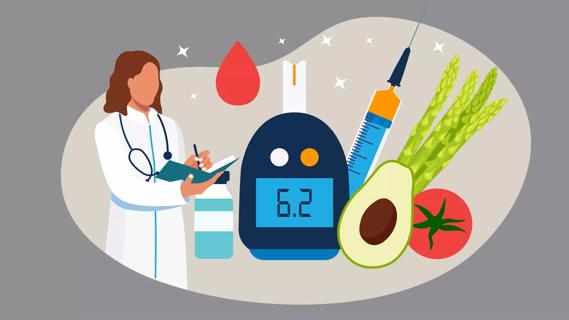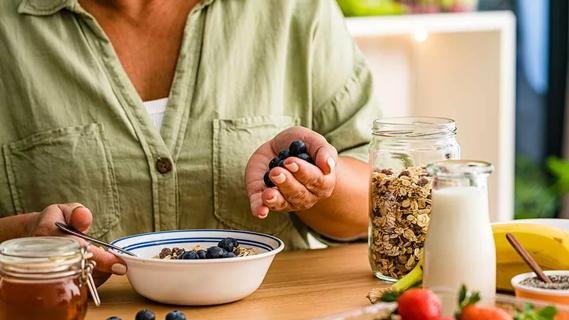The good news? Prediabetes can be erased with healthy lifestyle changes, including eating more nutritious foods

Prediabetes is essentially a health warning stage. The diagnosis means your blood sugar is higher than it should be but not high enough to be classified as Type 2 diabetes, a chronic and often life-shortening disease.
Advertisement
Cleveland Clinic is a non-profit academic medical center. Advertising on our site helps support our mission. We do not endorse non-Cleveland Clinic products or services. Policy
It’s estimated that 38% of American adults have prediabetes and the health concerns that come with it. Globally, the rate is 6%.
Add it all together and you’re talking about nearly 300 million people at risk worldwide.
Now the good news: Prediabetes can be erased. Healthy lifestyle changes — including eating more nutritious foods — can reverse the diagnosis and bring blood sugar levels back into line.
To find out what should (and shouldn’t) be on your plate and how you can adjust your eating habits to move away from prediabetes, we turn to registered dietitian Julia Zumpano, RD, LD.
Think about liquids that are high in sugar, like honey or maple syrup. They tend to be thicker and a tad sticky, right? That’s because sugar molecules bond with water molecules to increase the density of the solution.
That might be desirable when applying a sweet-tasting coating to a biscuit or pancake. It’s not ideal, though, when “syrupy” describes the blood flowing through your body, says Zumpano.
Blood that has too much glucose, a kind of simple sugar, tends to move more slowly through your arteries. That can eventually weaken and damage blood vessels and lead to heart issues, vision problems, kidney disease and nerve problems.
Advertisement
Now, you do need some glucose in your blood, as it’s your body’s go-to source of energy. But when the average of your blood sugar levels (called hemoglobin A1c) reaches between 5.7% to 6.4%, this qualifies as prediabetes and deserves attention.
Video content: This video is available to watch online.
View video online (https://cdnapisec.kaltura.com/p/2207941/sp/220794100/playManifest/entryId/1_th96jt2c/flavorId/1_5f3sgelj/format/url/protocol/https/a.mp4)
Prediabetes affects 1 in 3 Americans but is often reversible with lifestyle changes, including eating balanced meals with protein, healthy fats and fiber.
Rethinking your diet to address prediabetes (and reduce your risk of developing diabetes) doesn’t have to mean giving up foods you love, says Zumpano. It may, however, mean eating them less often and in smaller amounts while adding in more nutritious alternatives.
Here’s a rundown of foods to limit or avoid, as well as items to best fill up your plate and belly without sending your blood sugar soaring.
Cutting back or eliminating these items from your pantry can help keep your blood sugar levels down.
Dropping your blood sugar starts with … well, dropping sugary items from your eating routine.
“Sugar is a quick-release carb, so your body quickly releases glucose into your bloodstream when you eat it,” explains Zumpano. “This causes a spike in your blood sugar level.”
The not-so-surprising list of foods often high in added sugar include:
Cutting out sugary beverages is one of the simplest — and, for some people, easiest — ways to lower your blood sugar. Consider these sweet sippers that can make your blood sugar skyrocket:
When you’re thirsty, water is your best bet, says Zumpano. If that’s too plain for you, try infusing it with fruits or herbs to punch up the taste.
Other good substitutes include unsweetened tea (hot or iced) or sparkling water. If you need a caffeine boost, plain coffee is naturally free of sugar.
While all carbohydrates raise your blood sugar levels, certain carbs tend to boost it in a jiffy, which isn’t ideal for regulating your system, notes Zumpano. These sudden spikes are often followed by crashes, too.
Simple (or refined) carbs fuel this up-and-down ride, given how easily they’re digested and quickly send glucose into your bloodstream. (Learn more about “good” and “bad” carbs.)
Examples of “bad” carbs include:
Alcoholic beverages are a form of carbohydrate. In general, of course, it’s best to consume alcohol in moderation or not at all, but it’s especially important if you’ve been diagnosed with prediabetes.
Advertisement
“If you’re going to drink, choose spirits with a no-calorie mixer or an option like light beer, seltzer or dry wine,” recommends Zumpano. “They contain the fewest carbs.”
Lowering your blood sugar often can be done by adjusting what sort of carbs you eat and adding protein and fiber to your diet. Let’s break it down.
Eating foods with “complex” carbohydrates can give your body the carbs it needs without that sugar dump brought by simple carbs, says Zumpano. That’s because fiber-rich complex carbs take longer to digest to slow glucose absorption.
Foods that fall in the complex carb category include:
Protein slows the rate carbohydrates enter your bloodstream, which works to keep blood sugar levels steady, explains Zumpano. Plus, proteins can help you feel fuller and reduce the urge to snack.
Healthy proteins include:
Advertisement
Fiber slows down digestion and glucose absorption. Know what’s usually loaded with fiber? Vegetables. “Load up on vegetables, particularly non-starchy ones,” advises Zumpano. “The fiber will help you feel full and satisfied.”
So, fill your plate with veggies such as:
Fruit is a nutrient-dense natural source of sugar best enjoyed in moderation. “Limit portion size to 1 cup or less at a time,” says Zumpano. (She also suggests leaning toward lower-sugar fruits, like berries and kiwi.)
Pairing fruit with a protein source can help slow the rate of glucose entering your bloodstream. Examples of proteins that go well with fruit include nuts and seeds (or natural nut butters), plain yogurt, cottage cheese, string cheese and hard-boiled eggs.
There’s no single one-size-fits-all diet for prediabetes, though there are eating plans that offer a beneficial framework. The Mediterranean diet is one example. Ditto for the ketogenic (keto) diet and intermittent fasting.
“What works for one person may not work as well for another,” clarifies Zumpano. “It can be very personalized. Overall, the goal should be to establish healthier eating habits that work for your lifestyle, your taste and your preferences.”
Advertisement
Zumpano recognizes that making changes to lifelong eating habits to address prediabetes can be difficult. But if you make the effort, know that you’re taking a positive step for your overall health that may help you live longer and improve your quality of life.
When it comes to preventing Type 2 diabetes (the step following prediabetes), studies show that lifestyle changes like eating better and exercising more may be more effective than medications.
Weight loss is a big part of that, too. Research shows that 5% to 7% weight loss when coupled with physical activity can reduce your risk for developing Type 2 diabetes by 58%. If you’re over the age of 60, your risk goes down by 71%.
“Early intervention in prediabetes is the key to successful reversal,” encourages Zumpano, “and a healthy diet plays a huge role in that process.”
Learn more about our editorial process.
Advertisement

Hot, humid weather can affect your blood sugar levels and even cause dehydration or heat stroke

Fresh or frozen fruits that are low on the glycemic index should be your go-to, as they’re full of fiber and other nutrients

Adding nuts like pistachios, almonds or pecans to your diet can help manage blood sugar levels

A diabetes diagnosis, new or long-standing, can trigger reactions like grief, stress, depression and frustration, but symptom relief and help are available

The short answer: Yes, but you need to eat it in moderation and keep track of how much you consume

Sweet potatoes are great, but sweetened drinks aren’t so great

Some sweeteners may have health risks, so it’s best to keep your intake moderate

Lifestyle changes like diet and exercise can help

The tropical fruit is a good source of antioxidants and vitamin C

Most people fall asleep within 10 to 20 minutes, but if your experience is different, adjusting your sleep schedule may help

Exploring your hidden side can lead to better understanding of what makes you tick